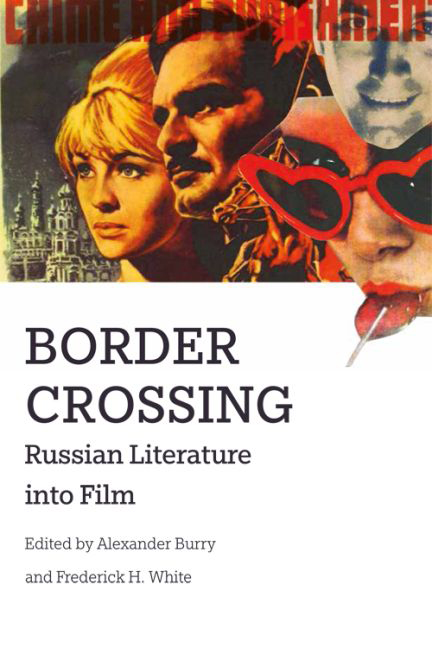Book contents
- Frontmatter
- Contents
- List of Figures
- Notes on the Contributors
- Introduction: Filming Russian Classics—Challenges and Opportunities
- 1 Across the Russian Border
- 2 Dostoevskii's “White Nights”: The Dreamer Goes Abroad
- 3 On Not Showing Dostoevskii's Work: Robert Bresson's Pickpocket
- 4 Stealing the Scene: Crime as Confession in Robert Bresson's Pickpocket
- 5 The Eye-deology of Trauma: Killing Anna Karenina Softly
- 6 “A Vicious Circle”: Karen Shakhnazarov's Ward no. 6
- 7 A Slap in the Face of American Taste: Transporting He Who Gets Slapped to American Audiences
- 8 Against Adaptation? The Strange Case of (Pod) Poruchik Kizhe
- 9 Chasing the Wealth: The Americanization of Il'f and Petrov's The Twelve Chairs
- 10 Fassbinder's Nabokov—From Text to Action: Repressed Homosexuality, Provocative Jewishness, and Anti-German Sentiment
- 11 “The Soviet Abroad (That We Lost)”: The Fate of Vasilii Aksenov's Cult Novel A Starry Ticket on Paper and on Screen
- Conclusion: Passport Control—Departing on a Cinematic Journey
- Bibliography
- Filmography
- Index
Conclusion: Passport Control—Departing on a Cinematic Journey
- Frontmatter
- Contents
- List of Figures
- Notes on the Contributors
- Introduction: Filming Russian Classics—Challenges and Opportunities
- 1 Across the Russian Border
- 2 Dostoevskii's “White Nights”: The Dreamer Goes Abroad
- 3 On Not Showing Dostoevskii's Work: Robert Bresson's Pickpocket
- 4 Stealing the Scene: Crime as Confession in Robert Bresson's Pickpocket
- 5 The Eye-deology of Trauma: Killing Anna Karenina Softly
- 6 “A Vicious Circle”: Karen Shakhnazarov's Ward no. 6
- 7 A Slap in the Face of American Taste: Transporting He Who Gets Slapped to American Audiences
- 8 Against Adaptation? The Strange Case of (Pod) Poruchik Kizhe
- 9 Chasing the Wealth: The Americanization of Il'f and Petrov's The Twelve Chairs
- 10 Fassbinder's Nabokov—From Text to Action: Repressed Homosexuality, Provocative Jewishness, and Anti-German Sentiment
- 11 “The Soviet Abroad (That We Lost)”: The Fate of Vasilii Aksenov's Cult Novel A Starry Ticket on Paper and on Screen
- Conclusion: Passport Control—Departing on a Cinematic Journey
- Bibliography
- Filmography
- Index
Summary
Russian literature has inspired film directors at home and abroad for over a century, and continues to do so today. American, British, French, German, and Italian cinema all have important film classics that were drawn directly from Russian literature. Some, such as French filmmaker Robert Bresson or Japanese filmmaker Akira Kurosawa, turned to Russian writers more than once in creating their own distinctive cinematic style. Kurosawa reimagined Fedor Dostoevskii's The Idiot (Hakuchi, 1951); Maksim Gor'kii's Lower Depths (Donzoko, 1957); incorporated elements of Dostoevskii's The Insulted and Injured in his film Akahige (1965); and animated Vladimir Arsen'ev's autobiographical work Dersu Uzala (1972), which won the Academy Award for Best Foreign Language Film, for Mosfilm. Throughout the years, Russian directors have expressed their own admiration for the literary works of Dostoevskii, Anton Chekhov, Mikhail Bulgakov, Aleksandr Pushkin, Lev Tolstoi, Mikhail Sholokhov, and many, many others.
The topic of this collection of essays has been the cultural border crossings that occur when the text is transported to another country, another time, or both. Each one of these migrations involves a new semantic language. The metaphor of crossing from one temporal or spatial territory into another in which language, customs, cultural identity, social attitudes, and political systems are often different is applied in this case as Russian texts are transposed in order to suit new cinematic environments. Thomas Leitch borrows from Cristina Della Coletta in positing the idea of a cinematic border crossing as a process that enables viewers to gain a greater perspective on the world in which they live. This collection of essays confronts many of the matters involved in transporting a narrative into a narration, making the cinematic out of the theatrical, or expanding the short story into a full-length feature. Border Crossing: Russian Literature into Film explores the question of what makes Russian texts adaptable for such diverse audiences with dissimilar cultural sensibilities.
- Type
- Chapter
- Information
- Border CrossingRussian Literature into Film, pp. 239 - 264Publisher: Edinburgh University PressPrint publication year: 2016

